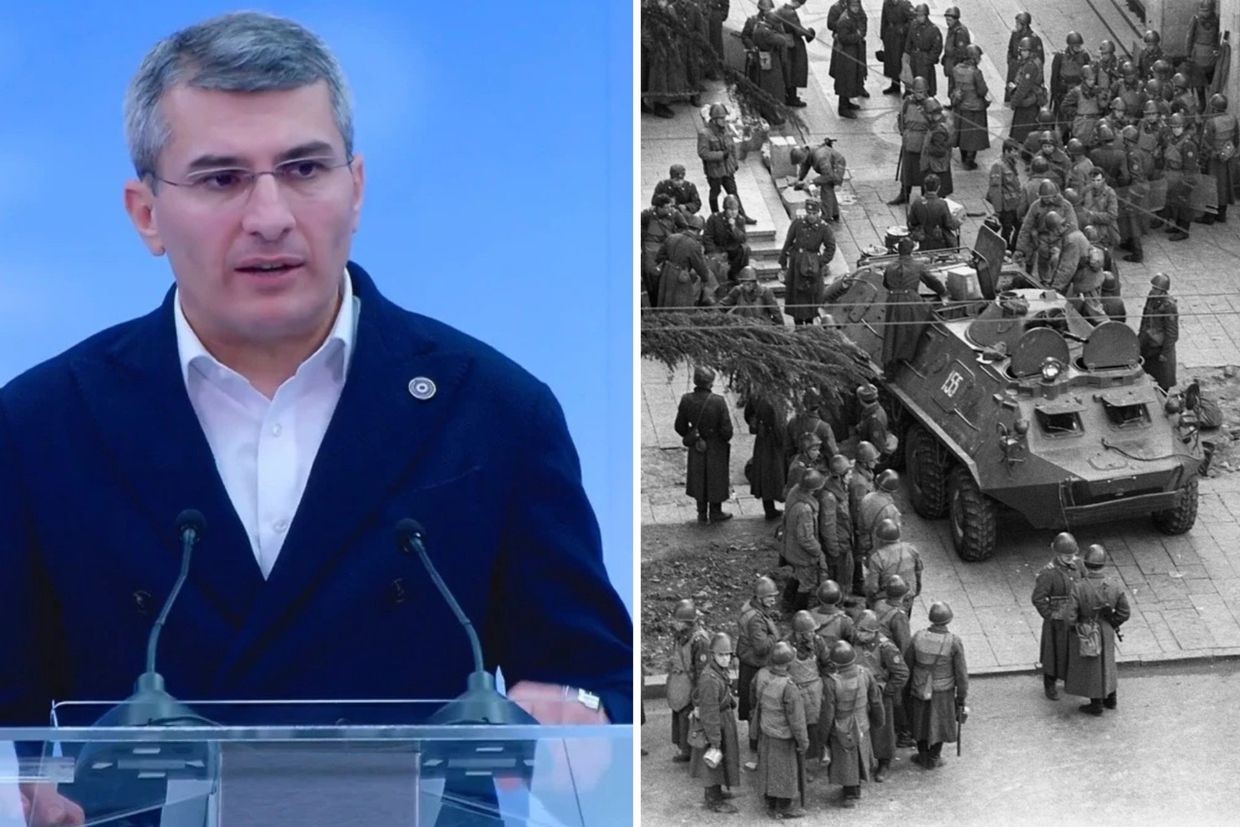UK imposes new sanctions on Georgia, which Georgian Dream compares to the 1989 Soviet massacre

The UK has imposed new sanctions on several Georgian government officials, including Prosecutor General Giorgi Gabitashvili. Soon after, Mamuka Mdinaradze, the parliamentary leader of Georgian Dream, equated the international sanctions against the ruling party to the massacre carried out by Soviet troops in Tbilisi on 9 April 1989.
According to the decision announced on Thursday, four high-ranking officials have been sanctioned ‘for their role in allowing serious human rights violations in response to legitimate protests in Georgia since 2024’.
Among those sanctioned are Prosecutor General Giorgi Gabitashvili, Head of the Special Investigatory Service Karlo Katsitadze, First Deputy Minister of Internal Affairs Shalva Bedoidze, and Deputy Chief of the Special Tasks Department Mirza Kezevadze.
The UK government stated that Georgian Dream responded to a series of public protests that erupted last year with an aggressive crackdown on demonstrations, attacking and arbitrarily detaining members of civil society, media, and opposition figures.
The statement emphasised the UK’s role as the first country to sanction Gabitashvili and Katsitadze for ‘failing in their positions to properly investigate those responsible for serious violence’.
‘These measures support the UK government’s work internationally to protect human rights, to reduce global instability and deter threats to UK national security — one of the foundations of the Prime Minister’s Plan for Change’, the announcement read.
The statement also quoted Foreign Secretary David Lammy, who said ‘our sanctions show the UK will not accept such a blatant lack of accountability by those in charge, and will continue to consider all options available to us until Georgia reverses its current trajectory’.
Following the announcement, Mdinaradze wrote on social media that when Georgia’s independence, along with people’s lives and freedoms, were under attack with tanks and shovels 36 years ago, now, in 2025, the weapon has become sanctions — and the target is once again Georgia’s independence, as well as people’s economic freedom.
‘Moral: The word independence does not only mean independence from Russia — it is a much broader concept that includes all foreign countries and powers!’ he concluded.
This was not the first time that Georgian Dream used the anniversary of the 9 April massacre — when Soviet troops killed 21 pro-independence Georgians — as an occasion to attack its opponents. Previously, leaders of the ruling party compared anti-government protesters who staged a 24-hour protest at the 9 April Memorial this week to the Soviet soldiers.

Georgian Dream MP Nino Tsilosani also responded to the UK sanctions on the pro-government channel Imedi TV, claiming that the aim of the international sanctions can be, for example, to ‘intimidate’ the Prosecutor General and make him ‘prefer having a bank account over fulfilling his direct duties’ and for ‘heroic police officers not to defend this country from a coup’.
In response to the host’s remark that the UK cited human rights violations as the reason for the sanctions, Tsilosani claimed that police officers had ‘heroically endured’ the actions of protesters and ‘handled the situation calmly’.

She also stated that protesters who block central avenues and ‘organise acts of sabotage’ are being fined a ‘harmless’ ₾5,000 ($1,800), pointing to the massive fines for road blockages — sums that exceed the monthly income of the vast majority of Georgians.
The UK, like several other countries, had already sanctioned members of the Georgian government prior to this recent move. In December, together with the US, it imposed sanctions on Georgia’s Minister of Internal Affairs, Vakhtang Gomelauri, for violence against protesters, along with other high-ranking police officials.
Earlier this month, it was revealed that the UK had imposed financial sanctions on two Georgian judges — Levan Murusidze and Mikheil Chinchaladze — who had previously been accused of maintaining close ties with the ruling Georgian Dream party.
The UK also already paused its annual flagship strategic dialogue with Georgia — the ‘Wardrop Dialogue’ — even before last October’s controversial parliamentary elections, citing democratic backsliding and anti-Western rhetoric by the Georgian government as the reason.
In December, amid police violence during protest rallies, London also announced it was halting aid and cooperation with the Georgian government.
Over the last few months, a number of countries have imposed sanctions, both financial and travel, on Georgian officials and suspended cooperation in various forms.
Among those sanctioned are leaders of the ruling party, with some measures directly targeting its founder Bidzina Ivanishvili, as well as government officials and senior police officers.
The demand for international sanctions is frequently voiced by participants of anti-government and pro-European protests, who have been holding daily demonstrations outside the Georgian Parliament since 28 November, when the ruling party halted the country’s EU membership bid.
The announcement came a month after the Central Election Committee handed the Georgian Dream victory in parliamentary elections that saw widespread incidents of vote buying and breaches of voter secrecy.
Police responded to the protests with violence, including what appeared to be repeated and deliberate attacks on journalists.
Protesters detained during the demonstrations have reported being systematically robbed and beaten by police, with testimony from several detainees revealing episodes of extreme violence and intimidation.
In parallel, Georgian Dream quickly initiated numerous restrictive bills in parliament targeting street protests, the media, and civil society. Many of these laws have already been passed.
Since the protests began, the ruling Georgian Dream party has continued to double down on its attacks on the West, accusing opponents of conspiring against the state and repeatedly claiming that the restrictive measures are necessary to counter external forces attempting to undermine stability in Georgia.











